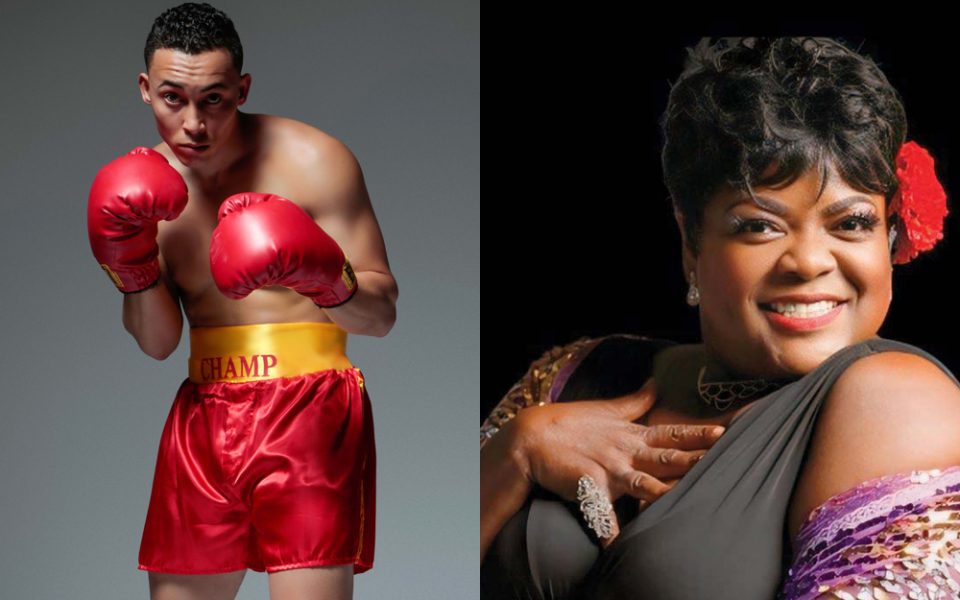Last century’s heroes can seem less impactful when looking back at them through a few decades, after the last chapters of their stories have already been written, reducing their biographies to shorthand. Muhammad Ali won a few fights. Nell Carter starred in a couple shows on Broadway.
But in this distance we can also see the arc of their lives as complete, the context in which they lived, the things that happened because of them.
Ali rose to prominence first in American history, but From Birmingham to Broadway, the one-woman show about the storied star of Broadway and television, comes first in the International Black Theatre Festival’s pairing of the two plays in downtown Winston-Salem this week.
Starring Tarra Conner Jones, From Birmingham to Broadway recounts the highlights of Carter’s career in her own words, or reasonable facsimiles thereof, from her stage debut in the rock opera Soon in 1971, which also starred Barry Bostwck and Richard Gere, to her star turn in Ain’t Misbehavin’, which is where she made her name — literally, as she played herself in the role.
We also learn more of Carter’s backstory: her childhood in Birmingham at the height of the US Civil Rights Movement. She was a teenager when the Ku Klux Klan firebombed the 16th Street Church in Birmingham and Rev. Martin Luther King Jr. wrote his famous letter from the jail in her city.
We learn about the sexual assault that gave her her first child, and how she relinquished that child to her sister when Carter realized she could not properly care for the baby. And she speaks about her lifelong search for love that never really materialized before her untimely death at age 54.
Conner Jones peppers this monologue with songs from the era and Carter’s own catalog. Her appropriation of Carter’s voice is spot-on: brassy like a horn or sultry as silk. And she takes on Carter’s sexypot persona with aplomb, making at least one audience member visibly uncomfortable. There is not much of a fourth wall in this production.
Understandably, every one-person stage biography relies heavily on the actor’s impression of the character. And in Float Like a Butterfly, lead Darius Autry assimilates a pretty good take on Muhammad Ali, tracing his loud, brash persona in youth to the more reserved, statesmanlike Ali of his later years and his descent into Parkinsnon’s Disease towards the end of his life.
The piece reminds us that Ali was transcendent, Sports Illusrtated’s Athlete of the Century, at one time the most famous person in the world.
Ali’s boxing skills were inarguable. Autry seems to have spent some time in the training room in preparation for this role, flicking jabs and dancing his feet almost as fluidly as the man himself. But we’re reminded that, from his first Golden Gloves and subsequent Gold Medal in the 1960 Olympics all the way to the end, Ali stood for something, never wavering in his convictions about justice and what is right.
Ali stood with MLK; he befriended Malcolm X and joined the Nation of Islam before changing his name. He was fully prepared to go to jail rather than be drafted into the Vietnam War, willingly giving up his championship title on this principle. Even now, eight years after his death, we understand that Ali still has an effect on this world: in sports as the first brash, young upstart who backed his bravado with skill; in activism as one of the first celebrities to demand justice; in the Black community as one of the bravest men of his time.
The script is culled mostly from Ali’s own words, revealing another thing we might not have gleaned from the man during his time: He was a philosopher who saw through the facade of American life, and wasn’t afraid to talk about what festered beneath.
Float Like a Butterflyand From Birmingham to Broadway show again on Wednesday, July 30 at 2 and 8 pm at Reynolds Place Theatre at the Milton Rhodes Center for the Arts.
Join the First Amendment Society, a membership that goes directly to funding TCB‘s newsroom.
We believe that reporting can save the world.
The TCB First Amendment Society recognizes the vital role of a free, unfettered press with a bundling of local experiences designed to build community, and unique engagements with our newsroom that will help you understand, and shape, local journalism’s critical role in uplifting the people in our cities.
All revenue goes directly into the newsroom as reporters’ salaries and freelance commissions.


Great write-up still smiling at i.t.
Thanks! Loved Ali.